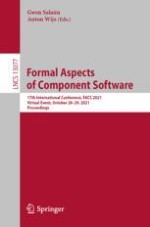2021 | Buch
Formal Aspects of Component Software
17th International Conference, FACS 2021, Virtual Event, October 28–29, 2021, Proceedings
herausgegeben von: Gwen Salaün, Dr. Anton Wijs
Verlag: Springer International Publishing
Buchreihe : Lecture Notes in Computer Science
